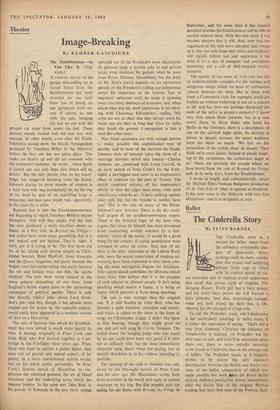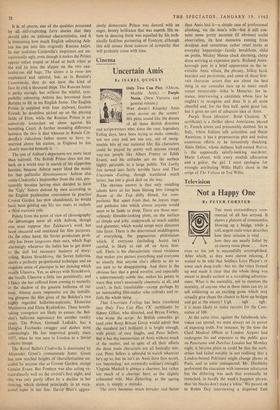Ballet
The Cinderella Story
By CLIVE BARNES
To call the Prokofiev music sub-Tchaikovsky is not particularly insulting. In ballet music it is rather the equivalent of saying: 'That's not a very large diamond.' Certainly the influence of Tchaikovsky is marked, yet Prokofiev has his own tunes to spin, and even if he sometimes spins them out, there is more melodic invention to be found in Cinderella than in the average run of ballets. The Prokofiev music, as it happens, proves to be almost the only common denominator between the British and Soviet ver- sions of the ballet, comparison of which was made possible last week *ken the Royal Ballet revived Ashton's production almost immediately after the Soviet film of the original Bolshoi reading had been first seen at the Festival Hall. It is, of course, one of the qualities possessed by all self-respecting fairy stories that they should take on national characteristics, and it is interesting how much English colouring Ash- ton has put into this originally Russian ballet.
In our tradition Cinderella's stepsisters are un- equivocally ugly, even though it makes the Prince appear either stupid or blind or both when at the end he tries the slipper on the two can- tankerous old hags. The sisters a la russe are unpleasant and spiteful, but, as in Rossini's Cenerentola, they do not have the kind of face to sink a thousand ships. The Russian Jester is perky enough, but without the wistful, sym- pathetic colouring Ashton has borrowed from Buttons to fill in his English Jester. The English Prince is supplied with four stalwart, faceless Frienth, he doubtless picked up on the playing fields of Eton, while the Russian Prince is an autocratic iconoclast set alone against his bumbling Court. A further revealing difference between the two is that whereas in Russia Cin- derella's ridiculous father seems to have re- married above his station, in England he has clearly married beneath it.
The rest of Ashton's departures are more local than national. The British Prince does not em- bark on a world tour in search of his slipperless heroine, because Ashton never liked the music for that particular divertissement. Ashton also omits Cinderella's Stepmother from the cast, pre- sumably because having once decided to have the 'Ugly' Sisters danced by men according to the English pantomime convention (a practice Covent Garden has now abandoned), he would have been gelding one lily too many to include a third travestie role.
Purely from the point of view of choreography the advantages seem all with Ashton, though one must suppose that Zakharov's work has been obscured and mutilated for film purposes. On the other hand, the Soviet production prob- ably has fewer longueurs than ours, which flags alarmingly whenever the ballet has to get down to the dull but necessary business of story- telling. Raissa Struchkova, the Soviet ballerina, shows a perfectly proportioned technique and an exquisite sense of plastique in her dancing which recalls Ulanova. Yet, as always with Struchkova, she recalls Ulanova a little too persistently, and I fancy she has suffered from coming to maturity in the shadow of the greatest ballerina of our time. Almost more impressive are the tantalis- ing glimpses the film gives of the Bolshoi's two highly regarded ballerina-aspirants, Ekaterina Maximova and Elena Ryabinkina. These breath- taking youngsters are likely to ensure the Bol- shoi's ballerina supremacy for another twenty years. The Prince, Gennadi Lediakh, has a Douglas Fairbanks swagger and dashes most convincingly. He has improved greatly since 1957, when he was seen in London in a Soviet concert troupe.
The Royal Ballet's Cinderella is dominated by Alexander Grant's consummate Jester. Grant has now reached heights of characterisation un- sealed by anyone else at Covent Garden, except Geraint Evans. But Fonteyn was also acting ex- traordinarily well on the revival's first night, and this was only partly offset by a decline in her dancing, which showed principally in an occa- sional lapse in her line. David Blair's aggres- sively democratic Prince was danced with an eager, breezy brilliance that was superb. His re- turn to dancing form was equalled by his tech- nically faultless partnering of Fonteyn, although this still misses those nuances of sympathy that will probably come with time.



































 Previous page
Previous page